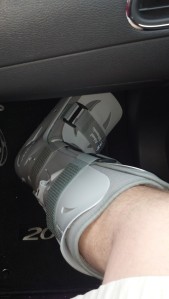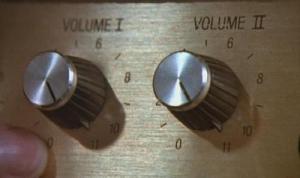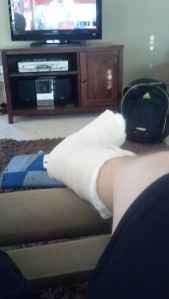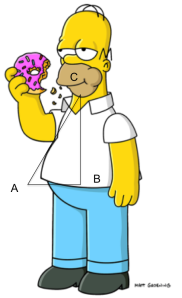No list of reasons for weight loss would be complete without a discussion of health. My health is not the only reason that I decided to make the commitment to losing weight. It may not even have been the primary reason. But it was most definitely an important factor in my decision.
Intellectually, I’ve known for decades about the health effects of excessive weight. I’ve known that carrying this extra weight endangers my health. But knowing that fact and doing something about it are two entirely different things. The harmful consequences of excessive weight often seem to be in the future, so it’s easy to rationalize to myself that I’ve got time to deal with it later. But lately, the health consequences of carrying all of these extra pounds have started to feel more real as my encounters with the health care system have become more frequent.
In a bold waiver of some of my HIPPA rights, here are some of those health issues I’ve experienced.
Sleep apnea – This won’t come as a surprise to some of you–college roommates, family members, the seismologists I notify before I fall asleep–but I snore. I’ve been told that I take snoring to a new level. While I should have taken that as a sign of sleep apnea, for a long time I thought I just snored. In 2002 I spent a night in a sleep lab and was diagnosed with obstructive sleep apnea. Since I’ve snored–and snored loudly–most of my life, and at various weights, I think that I would probably have sleep apnea even at my ideal weight. However, I don’t doubt that the bigger I get, the more I exacerbate my sleep apnea.
I now sleep with a CPAP machine. I know some people can never adjust to using them, but I am completely comfortable with it. However, it’s an annoyance. When I travel, it takes up extra room in my suitcase, and I’m also much less likely to carry on my luggage because it’s a hassle (and at least a slight embarrassment) to take the CPAP machine out of my luggage while going through security. As I discovered recently, doctors recommend getting “retitrated” every five years or so, which entails a night in a sleep lab. While that’s a benign enough experience, I discovered it’s a great way to use up my entire health insurance deductible.
Blood pressure – Blood pressure has been a nagging issue for several years. Most of my adult life I’ve been in the “moderate” range, where doctors would tell me that it is not technically high, but is close enough to monitor. When I was in Weight Watchers in 2007, I saw my blood pressure drop out of the moderate range, much to the delight of my doctor (one of the things I like about my doctor is that when I follow his instructions or make a healthy lifestyle change, I get lots of praise). As my weight rose, so did my blood pressure. In January of this year I started taking blood pressure medication. In a way, I’m lucky, because the medicine is cheap and I don’t feel any side effects. But the thought of having to take medicine because of my behavior infuriates me. My doctor has suggested that my weight loss may allow me to go off the medication when I have my next appointment in July, so that’s become another of my goals.
Umbilical hernia – In April of last year, I had surgery to repair an umbilical hernia. I won’t describe exactly what that is (feel free to read about it here), but it’s a condition that is most likely to occur in infants and overweight people. Since I get daily reminders that I’m not an infant, this is another suggestion that my weight has led to a problem requiring medical attention. It also managed to take care of my entire 2012 deductible.
The specter of diabetes – Thankfully, I have not developed Type 2 yet, but carrying excessive weight is a risk factor for Type 2 diabetes. Although obesity is linked to several other serious health issues–heart disease, stroke, even some cancer–for some reason, diabetes scares me more than any other. Even though those other conditions may be more final, maybe it’s the prospect of living with diabetes over a long period that worries me. Whatever the reason, watching that blood sugar number inch up seemed to be a greater motivation than any other health concern. However…
One scary January night – About a week after I started this weight loss, I woke up in the middle of the night with some pretty pain. It seemed to be coming from my abdomen or my side, and my first thought was appendicitis. But it seemed to radiate throughout my torso. When I tried to stand up, I couldn’t even stand up straight, I broke out into a cold sweat, and nearly passed out. I seriously wondered whether I was having a heart attack, and was seconds away from having Kris take me to the emergency room. Just as quickly as the pain started, it went away, and I decided to wait it out, and to visit my doctor first thing in the morning. The doctor determined that it was a muscle spasm, but it was at that exam when my blood pressure was high enough that the doctor prescribed the blood pressure medicine I continue to take.
While it wasn’t a heart attack, the episode made the prospect of a heart attack much more real to me.
Is it age or weight? – Since about the time of my 49th birthday in August, I’ve been noticing a lot of little nagging aches and pains, and a general feeling of blah. I know that aches and pains tend to be a natural by-product of aging. So as my 50th birthday gets closer and closer, I started asking, “Is it always going to be like this, or is this due to weight?”
Already, after 49 pounds, the answer is coming clearer. I’m sure that some of what I’ve felt is age-related, but the nagging pains and the blah feeling have largely (no pun intended) subsided.
Personal health is important. But increasingly, when I think of the interaction of weight and health, my mind goes to dollars and cents. You may have noticed that I referred to costs of procedures and prescriptions that I wrote about above. I’d obviously like to keep more of my money. But it comes into play professionally, since I’m the executive director of a small nonprofit that faces ever-rising health care costs. And finally, the policy wonk in me is keenly aware of health care costs, listening to the ongoing debate about the Affordable Care Act. Experts tell us that obesity is one of the leading causes of health care problems, and, therefore, of health care spending. I don’t want to contribute to that trend, so saving money on health care expenses is a definite motivator.
Who knows, maybe I’ll save enough to buy a new Michigan hockey jersey.






